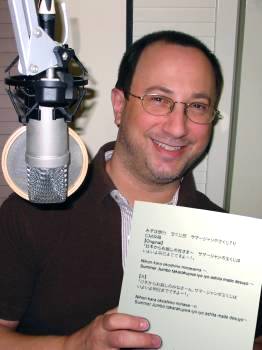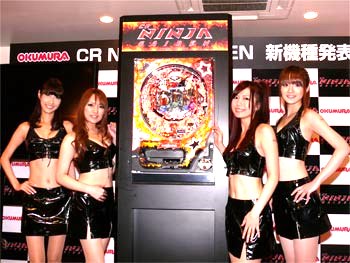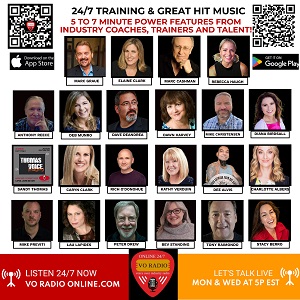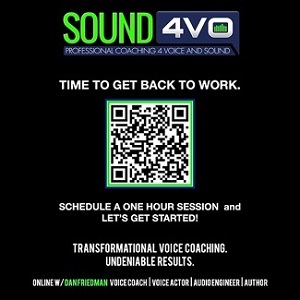|
Job Markets: Japan
Quit Radio Job, Moved To Japan ...
How Voice Overs Are Done There
By Mark Weitzman
Voice Actor
 In early summer 1993, working as an air-talent at a satellite radio network, and vexed by the creative limitations of satellite broadcasting, I quit my Denver, CO employer to go work in Japan. In early summer 1993, working as an air-talent at a satellite radio network, and vexed by the creative limitations of satellite broadcasting, I quit my Denver, CO employer to go work in Japan. Having Japanese friends up in Boulder, and because of the "Japan bashing" mania that had swept the USA, I'd become interested in Japan.
So by 1993 I'd made two trips to Tokyo to check out Japan and to look into the radio business there.
Following is what I found, how I established myself as a voice talent there, and how the Japanese market works for English-language voice overs.
THE CALL CAME ...
Anticipating employment in Japan, I learned how to read and write Hiragana and Katakana, two of the three Japanese alphabets.
And before long, the call came from a Tokyo radio program production company, and I was on my way to do a live radio show with a bilingual Japanese-English-speaking co-host in Sapporo.
Well, the show didn't materialize after I arrived, but I've been in Tokyo ever since.
REGISTERED WITH AGENCIES
I went to the few Tokyo agencies that handle non-Japanese actors and voice over talents and dropped off a voice over cassette demo of the few voice jobs I'd done back in the USA.
I paid JPY 1000 to register at a couple of those agencies.
My first jobs in Japan in 1993 were a succession of four documentary narrations produced by NHK, Japan's public broadcasting network.
And that's how I became a freelance voice talent by day and part-time English teacher at Berlitz by night.
VOICE OVERS IN JAPAN
Voice overs in any language in Japan are called "narrations," whether it's an actual narration or any other kind of voice over.
Voice talents are referred to as "narrators."
Besides voice talents, Japanese "announcers", who are the on-camera hosts of all kinds of Japanese TV programs, also do voice overs.
AGENCIES FOR FOREIGN TALENT
The number of agencies for non-Japanese has increased since 1993. Now there are dozens of agencies offering foreign talent.
One such agency website boasts 2,000 foreigners (www.f-w.co.jp/e/index.html). Most of these agencies are small operations run by two or three people.
A few agencies specialize in talent for games.
An agent usually accompanies the foreign voice talent to the studio to interpret during the recording session.
Non-Japanese usually register with many of the specialty agencies. By contrast, according to the industry's informal guidelines, Japanese talents and narrators are supposed to register with only one agency.
TYPES OF JOBS
What kinds of English-language voice jobs are offered in Japan?
In addition to documentaries, there are:
Also, many TV commercials aired in Japan include some English voice over.
INSERTING ENGLISH
Most common is a voice over of a company name in English at the end of an ad.
English is also inserted for key phrases or words. For instance, for a Honda auto commercial starring Ultraman, I said "I'm strong" within the ad.
TV commercials for broadcast outside Japan are also produced here in Japan.
MY VO JOBS
My experience in Japan includes English voice over for:
PREFERRED VOICES
Female voices dominate the English-language announcements on the subways and trains in Japan.
I leave the game character voice jobs to those wacky game-voice pros here, and the English-lesson CDs to narrators who have mastered the unique voice style usually required for such CDs.
For TV commercials for broadcast in Japan, clients often desire the attention-getting sound of a foreigner attempting to speak Japanese.
I don't speak much Japanese, but on occasion have done Japanese voice over of a few words or sentences. Every so often during a Japanese voice over session, I'm told my Japanese is too smooth, and I need to speak Japanese more noticeably badly!
NHK is a major employer of foreigners for its multilingual broadcasts and projects.
NEED A 'DAY JOB'
There are a large number of native speakers of English who are seeking narration work in Tokyo.
So, having other sources of income in addition to voice over earnings is the norm.
There seems to be a small, core group of native English voice talents who have been working in Japan since the late 1980s and early 1990s.
I suspect that this handful of established voices get the majority of jobs offered through the agencies.
MANY LEAVE
Many others available for narrations in Japan leave after just a few years. Economic conditions can prompt such folks to decamp.
The latest financial crisis – the Lehman Shock of 2008 – caused an immediate plunge in the number of productions requiring English - and Japanese - voice over, and a drastic decrease in narration fees.
This led to the departure from Japan of numerous foreign voice over people.
WHERE TO BE
Tokyo is the center of the voice talent, acting, TV, and movie business, and the voice over payments are highest here.
There are a few voice over agencies for non-Japanese in the other large cities in Japan, with a corresponding and noticeable decrease in payment rates compared to Tokyo.
WHAT'S THE PAY?
Voice over payments are dependent upon the usual factors relative to voice over rates.
Generally, the minimum is JPY 20,000 (about US $240) for a two- or three-minute production.
Like elsewhere, depending on the project, voice talents can be subject to restrictions on voicing projects for competing companies.
English language-lesson recording jobs start at about JPY 3,000 (about US $36) an hour. They can also be priced per-project.
These recordings do not necessarily require voice over experience.
WHAT AGENTS WANT
There are experienced agents, producers, directors and ad agency executives who can discern the capabilities of the people providing English-language voice over in Japan.
However, many clients, producers and directors - due to their limited or nonexistent spoken-English ability - often hire someone for voice over simply because the foreigner speaks native-English.
Similarly, many of the specialty voice agencies, whether in business for years or new to the scene, are concerned only with offering a large selection of voices.
One of my missions is to effect changes in the decision-making process among these wayward clients, producers, directors and agencies. Yes, only one man can stop them!
FEW HOME STUDIOS
In Japan, there is really no demand for voice over recorded in the absence of clients, agents, account executives, a director, and a producer, among others.
Japanese voice talents in Japan do not need to have a home recording studio in order to be competitive.
In Japan, only a handful of Japanese narrators have a home recording facility, necessary perhaps because the talent is working regularly with a company that provides a specific kind of project.
The number of non-Japanese voice talents with a home recording facility in Japan can be counted on the fingers of one hand
IN MY APARTMENT
In 2005, I devised a recording space in my Tokyo apartment in order to take advantage of worldwide voice over opportunities via the internet, and the occasional job within Japan.
I left Berlitz in 2006.
VARIETY OF STUDIOS
For voice over jobs in Japan, I usually go to studios in the Tokyo metropolitan area. These studios range from luxurious full-service state-of-the-art facilities, to a voice booth crammed into someone's tiny apartment, or a mic on a table with attendees squeezed in tightly all around.
One studio I've been to has a Sony PSP and a Nintendo DS handheld game device in the lobby, available to while away the time while everyone in the studio has a long discussion about the nuance of a certain phrase in the script.
I've travelled out of town only once for a job.
ISDN isn't utilized much here either.
SCRIPT IN ADVANCE
It's customary to be provided the script prior to the recording session.
English scripts often have been translated from a Japanese original, word for word, including Japanese-style syntax, and the conscientious narrator will be compelled to mention the need for rewriting, inevitably resulting in a delicate dance between the agent, client, and translator.
Usually, rewriting is accomplished.
BUT NOT ALWAYS ...
But sometimes, due to cultural disposition – matters of pride and deferment to superiors – the original poorly-written English script gets voiced.
One time, a script about wood-treatment chemicals had been machine-translated from Chinese to English. The client insisted it be recorded as-is.
I remember looking up from the script during the recording and seeing my agent, seated behind the client, stifling laughter. The read was unavoidably incoherent.
In addition to English voice over that I perform, in 2010 I started to represent those few Japanese voice talents in Japan who have home recording studios. So if you need a Japanese voice, give me a call!
ABOUT MARK ...
Mark Weitzman is a Tokyo-based voice talent performing English for TV commercials broadcast worldwide, movie and game trailers, documentaries, presentations and corporate narrations. His voice is also heard on mobile phone content, sporting event pre-game videos, arcade game prompts, soundtracks and other media. He represents Japanese voice talent who have home recording studios, and writes a fascinating blog about Japan, Let's Japan (see link below). "In 1995," he adds, "I married a Japanese woman from one of my Berlitz group English lessons. She manages a retail boutique honey store chain outlet in a shopping center nearby."
Email: vo-info@letsnarrate.jp
Lets Japan blog: www.letsjapan.markmode.com
 Your Daily Resource For Voice-Over Success
|
|
|
With Sean Daeley and Paul Stefano - check it out!
Inspiring interviews help your VO career
Email alerts to new VoiceOverXtra articles
For essential voice-over business strategies
As of the NEW website launch, 03/22/2012

 an arcade Pachinko machine that recently debuted (see photo),
an arcade Pachinko machine that recently debuted (see photo), 


.png)




Are you still here?
After 22 years I returned to Tokyo last year with my wife and 2 kids. I'm hitting the business full time along with trying to grow my YouTube channel.
Check out the channel so you'll remember me then lets collaborate.
We can use you in our videos.
Daniel Reton,
https://www.youtube.com/channel/UCmtgfyRcRb0jZoqQuFIWY3A
I ran across your blog entry looking up information on the voice over market in Japan. Like many here in L.A, I've only done small VO work for indie movies and low/non paying gigs, but behind the mic is still where I call 'home' regardless of my low level of success. It's the love that counts.
The information you've supplied is incredibly helpful in my research on how to get started in narrating for Japanese productions. Thanks for the insight. Best of luck to you. :)
Inspiring.
I'm also a former Berlitz guy. Now I'm quite interested in acting, voice acting, narrating and
the like. For some reason or reasons little success has come of my search. Your article was
of interest to me.
I've only done a couple of extra acting jobs--extremely delayed payment--and one very low paying
(though I must admit, enjoyable and short) narration job related to preparation for the 2020
Tokyo Olympics..
Thanks for sharing your insights.
John Davidson
In fact, VoiceOverXtra IS working on a series about voice over markets around the world.
I'd love to hear from readers who would like to contribute to the series - please just drop me a line a johnflorian@voiceoverxtra.com.
DS